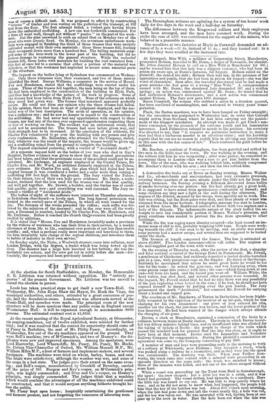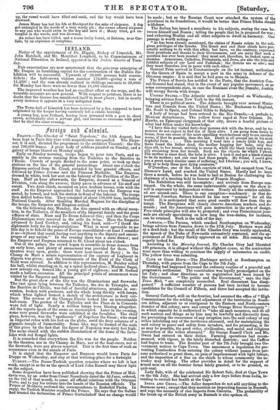tt Vrnuiurto.
At the election for South Staffordshire, on Monday., the Honourable E. R. Littleton was returned without opposition. He "entirely ap- proves" of the present Government. Mr. Littleton was too unwell to attend the election in person.
Leeds has taken practical steps to get itself a new Town-Hall. On Wednesday, Mr. John Hope Shaw the Mayor, Dr. Hook the Vicar, the municipal authorities, and others, attended by a great concourse of peo- ple, laid the foundation-stone. Luncheon was afterwards Served at the Music-Hall, and speeches were made. The principal room of the new structure will be more spacious than any public room in England except Westminster Hall : it will be capacious enough to accommodate 8000 persons. The estimated contract cost is 41,835/.
At the recent meeting of the Royal Agricultural Society, at Gloucester, six reaping-machines, out of twelve exhibited, were selected for further trial; and it was resolved that the contest for superiority should come off at Pusey in Berkshire, the seat of Mr. Philip Pusey. Accordingly, on Wednesday, five out of the six machines appeared on the ground. They were Bell's machine, two of M'Cormick's, and two of Hussey's : the du- plicates were new and improved specimens. Among the spectators, were Lord Harrowby, Lord Wharncliffe, Mr. Pusey, Dr. Pusey, Mr. Mechi, Dr. Cotton Vice-Chancellor of Oxford, Mr. William Mansell M.P., Mr. William Miles M.P., a host of farmers and implement-makers, and several foreigners. The machines were tried on wheat, barley, beans, and oats. The trials were satisfactory, although the weather was wet, and some of the crops in a bad state. The judges gave their award on the same even- ing; and Bell's reaper, manufactured by Cresskill of Beverley, carried off the prize of 20/. Burgess and Key's reaper, on M'Cormick's prin- ciple, was highly commended; and Dray and Co.'s reaper, on Ilussey's principle, was simply commended. The judges think that a machine Which would combine the advantages of all the machines exhibited could be constructed, and 'that it would surpass anything hitherto brought be- fore the public.
Mr. Pusey kept open house ; hospitably entertaining the gentlemen and farmers present, and not forgetting the concourse of labouring men, The Birmingham artisans are agitating for a system of ten hours work daily for five days in the week and a half-day on Saturday.
The differences between the Kingswood colliers and their employers have been arranged, and the men have resumed work. During the strike the sum of 450/. was contributed for the support of the miners, who behaved in a peaceable manner.
The moulders at two factories at Hayle in Cornwall demanded an ad- vance of Zs. a week-1/. 6s. instead of 11. 4s. ; and they turned out : in a few days they were recalled at the increased rate.
At Liverpool, Miss Wild, a milliner of Corporation Street, Manchester, prosecuted Hobson, traveller to Mr. Dunn, a draper of Newcastle, for slander. Mr. Dann directed Hobson to call on a Miss Wild at Manchester for 50!.; and he warned him that this lady was a slippery customer, who had been in prison six years ago, at Dunn's instance, for forgery. Hobson called on the plaintiff; she denied the debt ; Hobson then told her, in the presence of her apprentices and pupils, that she had been in prison for forgery—she was the worst of characters. Soon after, the traveller discovered that he had made a gross mistake—he had gone to a wrong "Miss Wild." A correspondence ensued with Mr. Dunn ; the slandered lady demanded 50/. and a written apology ; an action was commenced against Mr. Dunn ; he denied that he had authorized Hobson's statements ; and a new action was commenced against Hobson. The Jury now gave 1001. damages.
Susan Campbell, the woman who stabbed a sailor in a drunken quarrel, has been convicted of manslaughter, and sentenced to twenty years' trans- portation.
Flack, the Becton murderer, was to have been hanged on Friday sennight ; but the execution was postponed to Wednesday last, in order that Calcraft might arrive from Scotland, where he had been carrying out the punish- ment of the Glasgow murderers. An attempt was made to get Flack's sen- tence commuted, on the grounds of his extreme youth and his lamentable ignorance. Lord Palmerston refused to accede to the petition : his secretary was directed to say, that "it requires no particular instruction to make a man feel that a barbarous murder is an atrocious crime ; and his Lordship regrets that he can see no reason to justify him in advising any interference in this case with the due course of law." Flack confessed his guilt before he suffered.
Mr. Beecher, a resident of Nottingham, has been garotted and robbed by two men in the fields near the town. He MIS walking in the evening, and the robbers told him he was trespassing ; after some parley, he consented to accompany them to Lenton—this was a ruse to get him farther from the town. One of the men, who was walking. behind him, suddenly, compressed Mr. Beecher's throat with his arm ; and then the two robbed him.
A destructive fire broke out at Dover on Sunday evening. Messrs. Walker and Co., oil-merchants and seed-crushers, had very extensive premises, covering three-quarters of an acre, situate under the cliffs not far from the railway terminus. On Sunday evening a Rifleman discovered dense bodies of smoke hovering over one portion : the fire had already got a great hold. It is supposed to have arisen from spontaneous combustion of linseed; and some children say they saw a light in the mill during the afternoon, 'The engines of the district, manned by the troops, were speedily set to work. The tide was ebbing, but the flood-gates were shut, and thus plenty of water was obtained from the inner harbour. A telegraphic message was sent to London, and in three hours Mr. Braidwood arrived at Dover with two engines and a body of the Brigade. The inflammable nature of the stock baffled the at- tempts to save any considerable portion of Messrs. Walker's premises, and great exertions were needed to prevent the fire from spreading to other buildings. While the fire was raging anew disaster occurred—the heat caused an im- mense mass of cliff to fall, probably weighing 1500 tons. People were work-
ing beneath the cliff: it was seen to be moving, and an alarm was raised ; some persons had a narrow escape, and several men are supposed to be buried under the chalk.
The firemen at length conquered the flames. The loss is estimated at above 40,000/. Five London insurance-offices will suffer. The engines at the mill supplied part of the town with water.
On the evening of Thursday week, after the review of the fleet, a singular and fatal accident occurred at the George Hotel in Portsmouth. Mr. Powell, a gentleman of Chichester, had recklessly deposited a loaded double-barrelled gun in a case, with percussion-caps on the nipples. He dined at the George. Suddenly he ascertained that unless he made great haste he would be too late for the train : he seized the gun-case, and was hurrying away, when
some person came into contact with him ; the case—which hung down at one end—fell from his hand, and the loaded gun went off. William White, the
head waiter, was shot dead, and several other persons were wounded. At
the inquest, Mr. Powell stated that he had no idea there was any possibility of the gun exploding when locked in the case ; if he had, he should not have exposed himself to danger by putting away the gun loaded. The Jury pronounced the death "Accidental," but censured Mr. Powell for carrying about a loaded and capped gun.
The coachman of Mr. Bagshawe, of Norton in Derbyshire, has been fright- fully wounded by the explosion of the receiver of an air-gun, which he was charging for his own amusement one piece of iron entered his ribs, another cut the chest, the jaw-bone was broken, and the lower portion of the face lacerated. He had been warned of the danger which always attends the charging of air-guns. Davies, a clerk at Manchester, sustained a concussion of the brain by a collision between trains at Bootle station. The train in which Davies travel- led was fifteen minutes behind time, and an insufficient time was allotted for the taking of tickets at Bootle : the people in charge of the train which caused the mischief took for granted that the line was clear, as it ought to have been at that moment. Davies sued the Lancashire and Yorkshire Railway Company for compensation. Daring the plaintiff's examination an agreement was come to, the Company consenting to pay 360/. A number of men and boys were proceeding early in the monaing to work at a colliery at Whitworth, near Durham ; they occupied a truck, which
was pushed along a railway by a locomotive, and as they were late the speed was considerable. The morning was thick. When near Tudhoe iron- works, the truck came into contact with a mineral train proceeding in an opposite direction on the same rails : the truck was smashed to pieces; three of the inmates were killed, and not one of the others escaped without some hurt. While a vessel was proceeding up the Trent from Hull to Gainsbormigh, she upset : the crew escaped ; but a little boy was in a cabin, and it was feared had perished. The vessel drifted, keel upwards, to a sandbank. Here the little boy was heard to cry out. He was told to stop quietly where he
was; and as he did not seem to know what had happened, the people told hirnthat the key of the batches was lost. About five o'clock nest morning, when the tide had gone down and left the vessel nearly dry, a hole was cut, and the boy was taken out. He was sa.turated with wet, having been at one time up to the neck in water. Had the hole been cut when the tide was up, the vessel would have filled and sunk, and the boy would have been drowned.
James Massy has lost his life at Stockport for the sake of sixpence. A dog got entangled in the weeds of a very weedy pit ; the owner offered sixpence to any one who would swim to the dog and save it ; Massy tried, got en- tangled in the weeds, and was drowned.
An infant has been killed, and a nurse badly burnt, at Dalston, near Car- lisle, by an explosion of camphine.



























 Previous page
Previous page